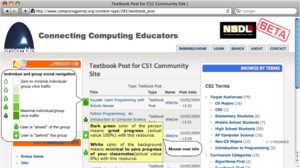Difference between revisions of "PERSEUS adaptation for Ensemble project"
(→Adaptation on Ensemble portal) |
|||
| Line 3: | Line 3: | ||
= Adaptation on Ensemble portal = | = Adaptation on Ensemble portal = | ||
| − | |||
| − | |||
[[Image:Portal-group-social-navigation.png|thumb|'''100'''|Figure 1. Group-based social navigation]] | [[Image:Portal-group-social-navigation.png|thumb|'''100'''|Figure 1. Group-based social navigation]] | ||
| − | |||
[[Image:Portal-group-n-individual-social-navigation.png|thumb|'''100'''|Figure 1. Group-based and individual social navigation]] | [[Image:Portal-group-n-individual-social-navigation.png|thumb|'''100'''|Figure 1. Group-based and individual social navigation]] | ||
| + | The main goal of enhancing Ensemble portal (http://www.computingportal.org) with adaptation is to provide an extra value to the rich collection of resources that the portal is currently hosting. Out of a large set of possible adaptation techniques we selected the one that captures the social traits of portal users. Namely, visualizes users' browsing behaviors. | ||
Revision as of 23:00, 8 July 2010
About Ensemble
Ensemble (see http://www.computingportal.org for details) is a new NSF NSDL Pathways project working to establish a national, distributed digital library for computing education. Our project is building a distributed portal providing access to a broad range of existing educational resources for computing while preserving the collections and their associated curation processes. We want to encourage contribution, use, reuse, review and evaluation of educational materials at multiple levels of granularity and we seek to support the full range of computing education communities including computer science, computer engineering, software engineering, information science, information systems and information technology as well as other areas often called “computing + X” or “X informatics.”
Adaptation on Ensemble portal
The main goal of enhancing Ensemble portal (http://www.computingportal.org) with adaptation is to provide an extra value to the rich collection of resources that the portal is currently hosting. Out of a large set of possible adaptation techniques we selected the one that captures the social traits of portal users. Namely, visualizes users' browsing behaviors.


